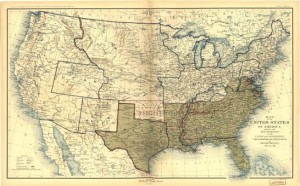 The war that many thought would end quickly yet rages on. In the North, U.S. President Abraham Lincoln and many other politicians blame U.S. Gen. George McClellan for the prolonged war. In charge of the Army of the Potomac since July 1861, McClellan has proven too timid and ineffectual in campaign after campaign, whereas his Confederate counterpart, Gen. Robert E. Lee, commander of the Army of Northern Virginia, has achieved many battlefield successes through daring strategies and bold movements. In addition, McClellan has increasingly displayed contempt for his Commander-in-Chief.
The war that many thought would end quickly yet rages on. In the North, U.S. President Abraham Lincoln and many other politicians blame U.S. Gen. George McClellan for the prolonged war. In charge of the Army of the Potomac since July 1861, McClellan has proven too timid and ineffectual in campaign after campaign, whereas his Confederate counterpart, Gen. Robert E. Lee, commander of the Army of Northern Virginia, has achieved many battlefield successes through daring strategies and bold movements. In addition, McClellan has increasingly displayed contempt for his Commander-in-Chief.
Today, Lincoln, finally having had enough of the incompetent and insolent McClellan, relieves the general of his command. Within a few days, Lincoln appoints Gen. Ambrose Burnside as McClellan’s replacement.
Relieved of his command, McClellan sets out to destroy Lincoln, fomenting further political division in the North even as the United States struggles to fight the Confederacy. Running for president as the “peace candidate” in 1864, McClellan loses in a tense contest to Lincoln and his commitment to freedom for all.
As Lincoln dismisses McClellan in Washington, D.C., in the Confederate capital of Richmond, Virginia, the Richmond Daily Dispatch prints a small announcement that portrays the heart of the Confederate cause.
Forty very likely Negroes will be sold in families, at Danville, Va, for each, on Wednesday, 19th November, at public auction — a large proportion between 10 and 20 years of age, and among them some good house servants.
These slaves are the relatively lucky ones: they are to be auctioned off as family units, a privilege not allowed many African slaves.
Well into the war, freedom (with very rare exceptions) remains available only to whites in the Confederacy, and most white Southerners (including most Baptists) cannot imagine ending the enslavement of blacks.
The Booker clan, mostly common folk Baptists, lives in the Danville, Virginia area. They lack money to purchase the slave families soon to be put for sale, but Booker menfolk fight for the slave Confederacy.
Twins James and John are now serving in the Confederate Army (Company D of the 38th Virginia Infantry), routinely writing to family members back home. James yet wants to believe the war will end soon. A few weeks earlier, he commented on civilians selling food and supplies to troops, preferring cooperative Northerners to reticent Quakers.
Yankees will sell us eny thing cheap for the specia …. the quakers will sell any thing thay have got when the spirit moves them, tho we cant catch them rite half our time
While not questioning the righteousness of the Southern cause, James and John now and in the months and years ahead grumble about the inequality between poor whites and the planter class. At one point, John (who will not survive the war) gives plain voice to their complaints.
I say put every one on equal foottin for this is a rich mans war an a por mans fight, I be leave thare are some of the men that have but in substitute are dooen a great [d]eal of good but the most of them are doo en more harm than good they are just speculaten on the poor people, an soldiers
And so the war goes on as fall deepens and winter beckons. The North is divided between peace and war, while the South, although committed to preserving liberty for whites only, is evidencing increasing strains of class resentment within army ranks.
Sources: “Lincoln Removes McClellan” (link); “Sale of Negroes,” Richmond Daily Dispatch, November 5, 1862 (link); “The John and James Booker Civil War Letters” (link)


